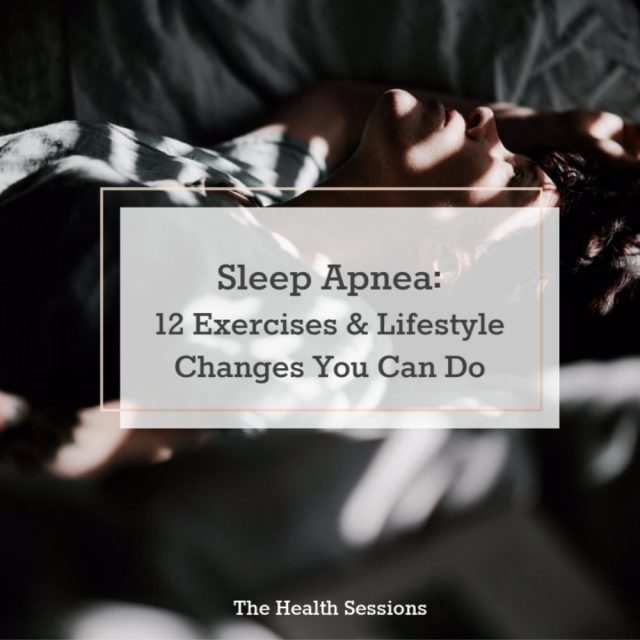Searching For That One Magic Cure: Why You’ll Never Find It and What You Should Do Instead

This article is written by Brittany Ashbury.
Does loud snoring make you feel exhausted throughout the day? You should not ignore heavy or loud snoring, as this can sometimes mean a more serious underlying problem.
Excessive grunts and snorts in the evening can be a sign of sleep apnea, particularly if the snoring is complemented with interrupted breathing that seems like choking or gasping. This condition not only disturbs a good night’s rest, but it can also mean serious health conditions such as heart ailments, depression, pulmonary diseases, and hypertension among others.
Today, we will discuss what sleep apnea is, its causes and symptoms, and sleep apnea exercises you can do to prevent or manage it.
Many of us see snoring as something to laugh about or something shameful we need to hide or just ignore. However, loud snoring, specifically those that come with daytime fatigue, can be a sign of sleep apnea.
According to WebMD, sleep apnea is a typical but serious condition in which breathing frequently stops and starts while you sleep. When you have this condition, you likely don’t recognize these breathing pauses that happen a couple of times per night, disturbing your natural sleep rhythm. All you are aware of is that your mental sharpness, energy and productivity are highly affected during the day.
The most typical kind of sleep apnea is obstructive sleep apnea, which happens when you have blocked airway that causes pauses in breathing and loud snores. Because sleep apnea only happens while you are asleep, you might only find out about it when your partner or roommate starts complaining or mentioning your snoring.
Although you might shrug the matter off or feel embarrassed about it, sleep apnea is something you should not ignore. It can be a serious danger to both your physical and emotional health.
For instance, you can experience sleepiness, poor concentration, slow reflexes, and heightened risk of accidents during the day because of chronic sleep deprivation. In addition, you can also have other serious health problems such as heart disease, diabetes, weight gain, and liver problems, among others.
However, you can control your snoring with the proper treatment and self-help methodologies. With exercise and some lifestyle changes, you can prevent sleep apnea, get adequate sleep, and feel great and alert during the day.

There are three kinds of sleep apnea — obstructive sleep apnea, central sleep apnea, and complex sleep apnea.
The most common type of them all is obstructive sleep apnea, which happens when your soft tissue in the back part of your throat suddenly relaxes while sleeping, blocking the airway and leading to loud snores.
Next, we have the less common sleep apnea that involves the central nervous system—the central sleep apnea. This happens when your brain fails to signal the muscles that control your breathing while you sleep. Also, take note that people with this condition seldom snore.
Finally, there is complex sleep apnea, which is a combination of obstructive sleep apnea and central sleep apnea.
It can be difficult to recognize sleep apnea on your own because the most prevalent symptoms only happen while you’re sleeping. However, you can quickly resolve this by having a bed partner to watch your sleeping habits or taking a video of yourself while you sleep. If you or your partner discovered pauses while snoring, and if they accompany choking or gasping, these are red flags, and you may be a candidate for sleep apnea.
Other warning signs include loud and chronic snoring, choking, gasping, or snorting while you sleep, deep pauses in breathing, feeling short of breath when waking at night, and sleepiness and fatigue during the day no matter how much you slept the night before.
There are also minor symptoms that you need to watch out for, such as having a sore throat or dry mouth as soon as you wake up, restless sleep or insomnia, frequent urinating at night, lack of concentration, forgetfulness, depression, irritability, impotence, and morning headaches.

Although having sleep apnea might scare you, it is, fortunately, a treatable condition. And yes, there are many natural steps you can take to improve your condition and prevent sleep apnea in the future. Sleep apnea exercises and lifestyle changes can work wonders in improving your symptoms. But first, let’s take a look at the causes of sleep apnea since it is easier to fight a condition when we know what’s causing it.
Anyone is at risk of sleep apnea, although you are more likely to have obstructive sleep apnea if you are an overweight male with relatives or family members that have the condition. You are also at risk if you’re 50 years old and above, have high blood pressure, a smoker, and with a neck circumference of greater than 40 centimeters.
Meanwhile, central sleep apnea is more prevalent in men and individuals who are 65 years old and above. This type of sleep apnea is frequently related to severe conditions like neurological or heart disease, stroke, and brainstem or spinal injury. In curing central sleep apnea, it is best to treat these underlying causes first, then focus on sleep apnea exercises and lifestyle changes later on.

You can strengthen your airway muscles through different sleep apnea exercises. Let’s start with tongue exercises. Since our tongue is a muscle, it relaxes while we sleep like all our muscles. Our tongue plays a key role in the way we breathe and even in its relaxed state should not hinder our breathing especially if its size is normal. Meanwhile, in case you have a large tongue, it tends to fall down and collapse back to your throat when you sleep. Hence, the occurrence of obstructive sleep apnea.
The following sleep apnea exercises should help alleviate your symptoms. Please note that if your sleep apnea is caused by obesity or other health issues, please consult a doctor as these exercises might only help obstructive and not central sleep apnea.
Yes. In fact, chewing gum before sleeping until your jaws are tender will help tighten the muscles that open and close your mouth.
Doing this, in addition to the above tongue exercises, may feel challenging or awkward at first, but they will naturally come as time passes. Spending some time doing these daily exercises will help you improve your symptoms of sleep apnea.

First, if you are overweight, losing the excess pounds can certainly help you. Being overweight means you can have extra tissue in the back of your throat. This tissue can fall and block your airflow while you sleep. Losing weight can significantly open up your throat and enhance your symptoms.
Next, if you are a smoker, try quitting as this contributes to sleep apnea by raising fluid retention, as well as inflammation in your upper airway and throat.
You should also avoid sleeping pills, alcohol, and sedatives, particularly before sleeping, since they relax muscles in your throat and affect your breathing.
Aside from helping you lose weight, exercising regularly can have a significant effect on the quality and duration of your sleep. In particular, resistance training and aerobic can help alleviate your symptoms, while yoga is great for improving your breathing and strengthening the muscles in your airway.
Moreover, you should avoid heavy meals and caffeine prior to going to bed (at least two hours).
Finally, try to maintain a steady sleep schedule for better rest and sleep. Sleep apnea occurrences lessen when you have lots of sleep.
If you have done the sleep apnea exercises religiously every day and made changes in your lifestyle, but they have not improved your sleep apnea, your first option is Continuous Positive Airflow Pressure (CPAP), since it is the most popular treatment for moderate to severe obstructive sleep apnea.
A CPAP machine is a mask-like device that covers your nose and mouth, giving a steady stream of air that maintains your air passages open while sleeping. The CPAP dreamstation, for instance, is an incredible machine to increase the comfort and efficiency of sleep apnea therapy. Available at Help Medical Supplies, the CPAP dreamstation is an auto-adjusting machine that adjusts pressure based on your breathing at night to give the maximum pressure you need.
Remember, if your sleep apnea symptoms are not improving, it is always better to consult a doctor because a more serious condition might be causing it.